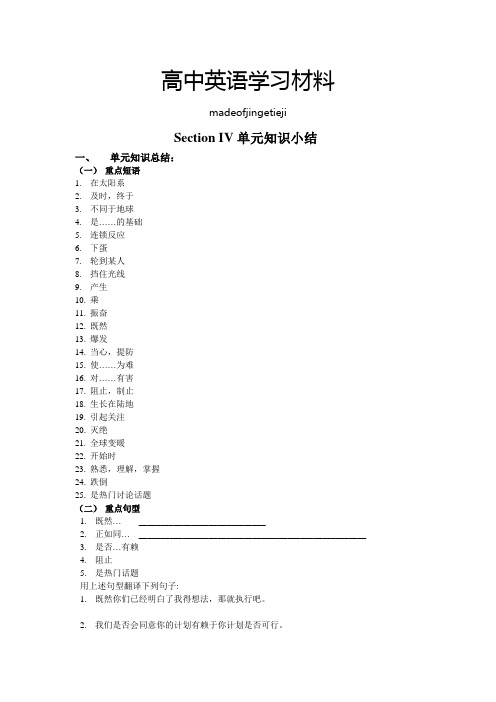高考英语(人教版)要点梳理 重点突破:必修3 Unit 4 Astronomy the science of the stars
- 格式:doc
- 大小:221.50 KB
- 文档页数:35

Unit 4 Astronomy:the science of the starsPeriod 1 Grammar points.一.语法要点主语从句:在复合句中作主句的主语的从句叫主语从句。
引导主语从句的词有连词that, whether;连接代词who, what, which;连接副词when, where, how, why等。
Eg: Which team will win the match is still unknown.主语从句放在句首,句子常显得笨重,因此一般把它放到句子后面,前面用引导词”it”来作主语。
Eg: It’s strange that he didn’t come yesterday.二.重点难点1.Nobody knew that it was going to be different from other planets going to be different from other planets going round the sun.going round the sun 为现在分词短语定语,表示一般的动作。
Eg: Men breaking the law will be punished.现在分词短语,也可表示进行的动作2. Weather life will continue on the earth for millions of years to come will depend on whether this problem can be solved.for millions of years to come 中不定式to come 作定语,与前面的名词有逻辑上的主谓关系。
Eg: She is the last person to tell lies.3.The problem was that the earth became violent because it was not clear whether the solid shape was to last or not.The problem was that …, that 引导表语从句,that 只起连接作用,无意义,但不能省略。



Unit 4 Astronomy:the science of the stars 课文知识点解析Warming UpDiscuss in pairs which science subjects are part of medicine,biochemistry,geophysics or astronomy.分组讨论哪些科学科目是医学,生物化学,地理学或天文学的一部分。
in pairs=two at a time=in twos一次两个,两个一组e.g.Shoes and slippers are sold in pairs.鞋子都是论双卖的。
注意:in+数词/名词(数词/名词以复数形式)e.g.in threes and fours 三三两两的in groups 成群的思维拓展in在这里表示:以……数量/形式、形状等。
e.g.Tourists queue in thousands to see the tomb. 游客数以千计排着队看陵墓。
Reading1.The problem was that the earth became violent because it was not clearwhether the solid shape was to last or not.这一问题变得越来越不确定,因为这一球体形状是否能够维持尚未明朗。
(1)violent adj. 猛烈的;激烈的;强暴的a violent language 激烈的语言a violent storm 猛烈的风暴a violent 猛攻思维拓展violence n.[U]1.暴力,强暴2.猛烈,剧烈,强烈(2)whether...or not... “是……还是……”在这里是主语从句,它还可以引导宾语从句、表语从句、同位语从句和状语从句。
e.g.I don’t know whether he will agree with me.(宾语)我不知道他是否同意我的观点。

高中英语学习材料madeofjingetiejiSection IV单元知识小结一、单元知识总结:(一)重点短语1.在太阳系________________________________2.及时,终于________________________________3.不同于地球________________________________4.是……的基础________________________________5.连锁反应________________________________6.下蛋________________________________7.轮到某人________________________________8.挡住光线________________________________9.产生________________________________10.乘________________________________11.振奋________________________________12.既然________________________________13.爆发________________________________14.当心,提防________________________________15.使……为难________________________________16.对……有害________________________________17.阻止,制止________________________________18.生长在陆地________________________________19.引起关注________________________________20.灭绝________________________________21.全球变暖________________________________22.开始时_____________________________23.熟悉,理解,掌握________________________________24.跌倒________________________________25.是热门讨论话题________________________________(二)重点句型1.既然… ____________________________________________________2.正如同… ____________________________________________________3.是否…有赖____________________________________________________4.阻止____________________________________________________5.是热门话题____________________________________________________用上述句型翻译下列句子:1.既然你们已经明白了我得想法,那就执行吧。

高中英必修三-Unit4 Astronomy:the science of the starsUnit4 Astronomy:the science of the stars1.基梳理astronomy solar system religion theory atom billion globe violent in time carbonnitrogen vapour atmosphere fundamental presence dissolve acid harmful chain reaction multiply oxygen shellfish amphibian reptile exist mammal thus in one’sturn dioxide prevent ⋯from puzzle biology gravity satellie gentle geologist block outextinct climate crash pull lessen cheer up float weightlessly cabin mass now thatget the hang of break out exhaust watch out2.1) solid作名,表示“固体”。
作形容,表示“固体的,固的;心的,的,牢靠的,立体的”。
be in solid with sb受某人的重,与某人关系很好。
feel solid about sth某事内心有底。
2) explode表示“爆炸,(感情)迸,快速增添”。
explode with/into sth冲,激。
3) surface作形容,表示“表面的,水面的”。
作名,表示“水面,表面,表面”。
on the surface在表面上,在表面上。
作,表示“加表,从头出,睡醒”。
4) dissolve表示“溶解,消融,分解”。
表示“解散,排除,除去”。
必修3Unit 4Astronomy: the science of the stars 要点梳理高效梳理·知识备考●重点单词1.astronomy n.天文学→astronomer n.天文学家2.system n.系统;体系;制度3.theory n.学说;理论→theoretical adj.理论上的4.globe n.球体;地球仪;地球→global adj.全球性的;全世界的5.violent adj.猛烈的;激烈的;强暴的→violence n.暴力→violently adv.猛烈地6.atmosphere n.大气层;气氛7.unlike prep.不同;不像→dislike vt.不喜欢8.presence n.出席;到场;存在→present adj. & n. & v.在场的;目前,现在;出席;颁发,授予9.harmful adj.有害的;伤害的→harm n.危害,害处→harmless adj.无害的10.exist vi.存在,生存→existence n.存在,生存11.puzzle n.谜;难题vt. & vi.(使)迷惑;(使)为难→puzzled adj.迷惑的→puzzling adj.令人迷惑的12.gravity n.万有引力;重力13.satellite n.卫星;人造卫星14.climate n.气候15.spaceship n.宇宙飞船16.pull n. & vt.拉(力);拖;牵引力17.float vi. & vt.(使)浮动;(使)漂浮n.漂浮物18.mass n.质量;团;块;大量;(复)群众●重点短语1.in time及时;终于2.lay eggs 下蛋3.give birth to产生;分娩4.in one’s turn 轮到某人;接着5.prevent...from 阻止;制止6.block out挡住(光线)7.cheer up感到高兴;感到振奋8.now that 既然9.break out突发;爆发10.watch out密切注视;当心;提防11.cool down 冷却12.as well as 也;还有……13.depend on依靠;依赖,取决于14.get close to 靠近●重点句型1.This produced a chain reaction, which made it possible for life to develop.这就形成一个连锁反应,使生命发展成为可能。
2.But when I tried to step forward, I found I was carried twice as far as on the earth and fell over.而当我试着向前迈步时,我发觉我被送出很远,步子的跨度竟是在地球上的两倍,因而我摔倒了。
3....walking does need a bit of practice now that gravity has changed.……既然重力改变了,行走的确需要一些练习。
●高考范文假定你是李华。
在一个英文网络论坛上,你看到一个名叫Grown-up的中学生发帖(post)寻求帮助,请根据帖子内容、写作要点和要求回贴。
写作要点:1.告诉Grown-up要理解母亲;2.给Grown-up提出解决问题的具体建议。
要求:1.短文需写在答题卡的指定区域。
2.短文词数不少于80(不含已写好的部分)。
3.内容充实,结构完整,语意连贯。
4.书写须清晰、工整。
Hi, Grown-up,As a student of your age, I understand your situation.________________________________________________________________________________________________________[范文]Hi,Grown-up,As a student of your age, I understand your situation.The problem you are facing is common among our teenagers. However, it should be wise not to do anything that may hurt her feelings. Here are a few suggestions.First, it's advisable to talk more with your mom. I learnt talks help you understand each other better. They are also opportunities to let her know your ideas of and attitudes toward many things.Second, you should learn to do your own things well, proving to your mom that you are already a “grown-up”,It's even better if you could share more of the housework, such as cleaning, washing and cooking.考点探究互动探究·能力备考Ⅰ.词汇短语过关1.harmful adj. 有害的;伤害的harm n.&vt. 损伤;伤害harmless adj. 无害的harmlessness n. 无害be harmful to 对……有害do sb. harm/do harm to sb. 对某人有害do more harm than good 弊大于利There is (no) harm in (sb.‘s) doing sth.(某人)做某事有(无)害处。
It does (no) harm (for sb.) to do sth. (对于某人来说)做某事有(无)害处。
mean no harm 没有恶意[即学即练1](1)Fruit juice can ______ __________ ______ children‘s teeth.果汁可能损坏儿童的牙齿。
(2)What he did _________ his reputation.他所做的损害了他的名声。
beharmfultoharmed(3)He may look fierce, but he _________ ______ ______.他可能看上去很凶,但并无恶意。
(4)The court case will ______ ______ ______ ______ my business.这起诉讼案件将严重损害我的生意。
meansnodoseriousharmto2.exist vi. 存在;生存;维持生活existent adj. 存在的,现存的existence n. 存在,生存There exists/existed....某地有……,存在……exist in 存在于……之中exist on 靠……为生exist by 靠……生存come into existence 开始存在;成立bring into existence 使发生,产生[即学即练2](1)________ always ________ a force of attraction between two bodies. 两物体间总是存在着吸引力。
(2)They ______ ______ very little food.他们靠极少的食物来生存。
(3)That word doesn‘t ______ in English.英语中没有这个词。
Thereexistsexiston(4)Fish can't ______ ______ ______ ______.鱼离开水就不能生存。
(5)When did the world ______ ______ ______________?世界是什么时候开始产生的?existoutofwatercomeintoexistence3.puzzle vt. 使困惑;使糊涂n. 难题;谜puzzling adj. 令人困惑的puzzled adj. 感到困惑的puzzle about/over sth. 苦苦思索;仔细琢磨puzzle sth. out 琢磨出……的答案;开动脑筋be in a puzzle about sth. 对某事迷惑不解set a puzzle for sb.(=set sb. a puzzle) 出个谜语叫某人猜be puzzled by 被……迷惑[即学即练3](1)It's quite ______ ______ ______ us why he did that. 他为何做那样的事,我们完全搞不懂。
(2)This sentence _________ me. 这个句子令我困惑。
(3)I ______ ________ how to solve the problem.我不知道怎样解决这个问题。
(4)The question is ________ to me. 这个问题令我困惑。
apuzzletopuzzleswaspuzzledpuzzling4.in one’s turn轮到某人;接着in turn依次;轮流;转而;反过来by turns轮流;交替take one’s turn轮到某人做……了take turns依次;轮班,轮流on the turn正在转变,正在变化out of turn不合时宜地,鲁莽地[即学即练4](1)The girls called out their names ______ ______.那些女孩儿逐一报出了自己的名字。
(2)We make every effort to make more films, and ______ ______ this creates furtherenvironmental pollution.我们在竭力生产出更多的电影,反过来这又造成了进一步的环境污染。
inturninturn(3)We kept watch ______ ______.=We ______ ______ to keep watch.我们轮流守望。
byturnstookturns5.prevent...from 阻止;制止stop sb. (from) doing sth. 阻止某人做某事keep sb. from doing sth. 阻止某人做某事protect sb. from...保护某人不受……侵袭,挡住,防御keep sb. doing sth. 让某人一直做某事[即学即练5](1)What can we do to ___________________ this disease ______ ___________?我们能做什么来防止这种疾病蔓延呢?(2)Don't ______ others ________ for long.不要让别人等太久。